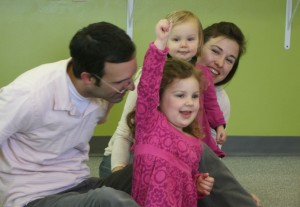Music and movement can benefit children and their adults in a multitude of ways. Over the next several months, we will be featuring a series of blog posts on The Neuroscience of Music*, explaining how music benefits children in many ways that parents and music teachers may not realize.
The first subject for this Benefits of Early Childhood Music Series explores how music can help parents teach their children to relax and be calm. Brain science educator, Dr. Dee Coulter, calls this skill the art of self calming. She explains, “It helps us build an ability to self-regulate that we will use our whole lives. But we aren’t born with a calming switch! Babies learn to calm by being calmed. One of the most powerful tools is music.”
The following are facts and information about how to use music to calm children from the earliest age:
- Sing to your baby and toddler, even in the womb – Research shows that even in utero, a baby hears and learns its mothers voice. By monitoring heartbeat in utero, the mother’s voice is shown to have a calming effect.
- Throughout history, songs and music have been a big part of child rearing, as beloved lullabies, rhymes, and dances are passed down from one generation to another. Pick a few lullabies and sing them often.
- Singing to infants communicates love and security, helps to strengthen the bond between mother and child, and aid digestion while counteracting stresses.
- Even if you believe that you are not a singer, repeatedly singing simple songs creates another level of familiarity and sense of safety for a child.
- Remember to stay relaxed, to use a soft voice and keep a warm heart. Even if your baby only thanks you with tears and distress for a while, be patient. The lullabies will work their magic in time.
- Sing during transition times such as naptime or feeding time to communicate that a change is happening.
- Move, sway and dance while you sing. Encourage toddlers to move with you while singing.
- As the developing child becomes more and more aware of their bodies, movement with music becomes even more important. Children need to move so that they become well acquainted with their bodies in order to learn how to hold still.
- Transitioning from music with movement to just soothing music or even quiet time helps your child recognize when s/he is too stimulated and needs to take a break.
Don’t worry if your singing is not pitch perfect, just fake it until you get it! The surprise bonus you receive from singing and moving with your child will be the relaxation and calm you will feel from developing a deeper relationship with your child!
*Musikgarten Delivers: The Neuroscience of Music collection by Dr. Dee Coulter is available for $10 in the Product Catalog section of our Teacher Portal. Username and password are required. You may also contact Musikgarten at 800-216-6864 to purchase.






